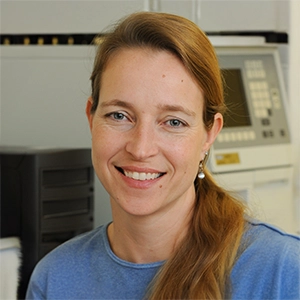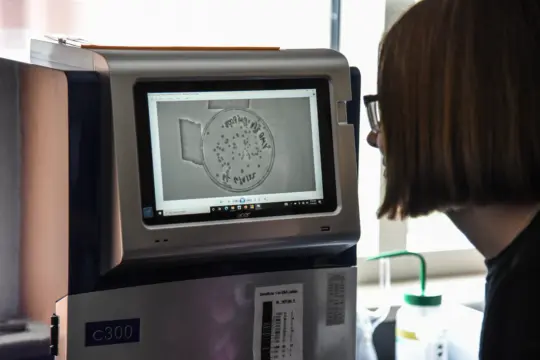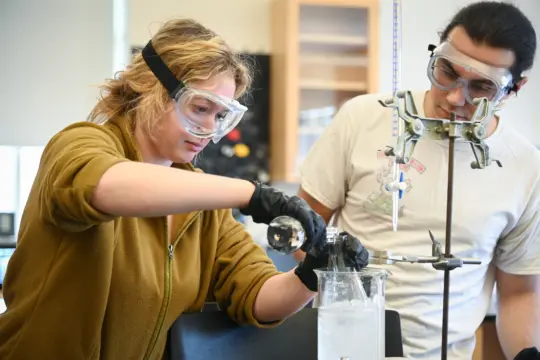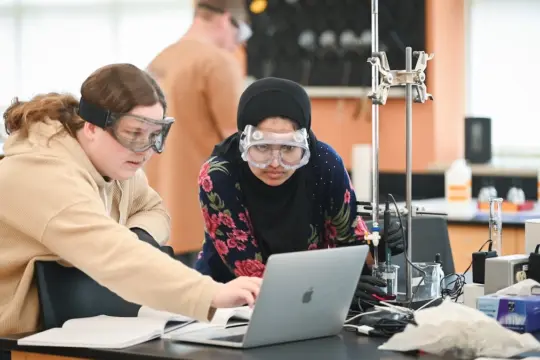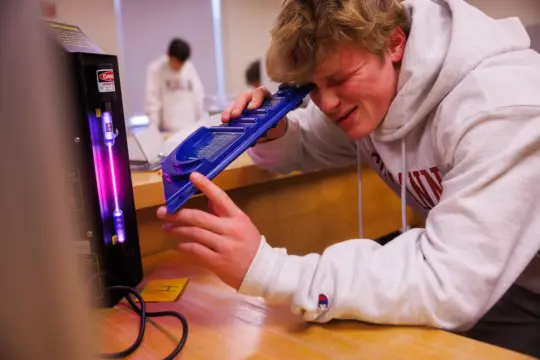Chemical Physics
Solve real scientific problems at the interaction of chemistry and physics.
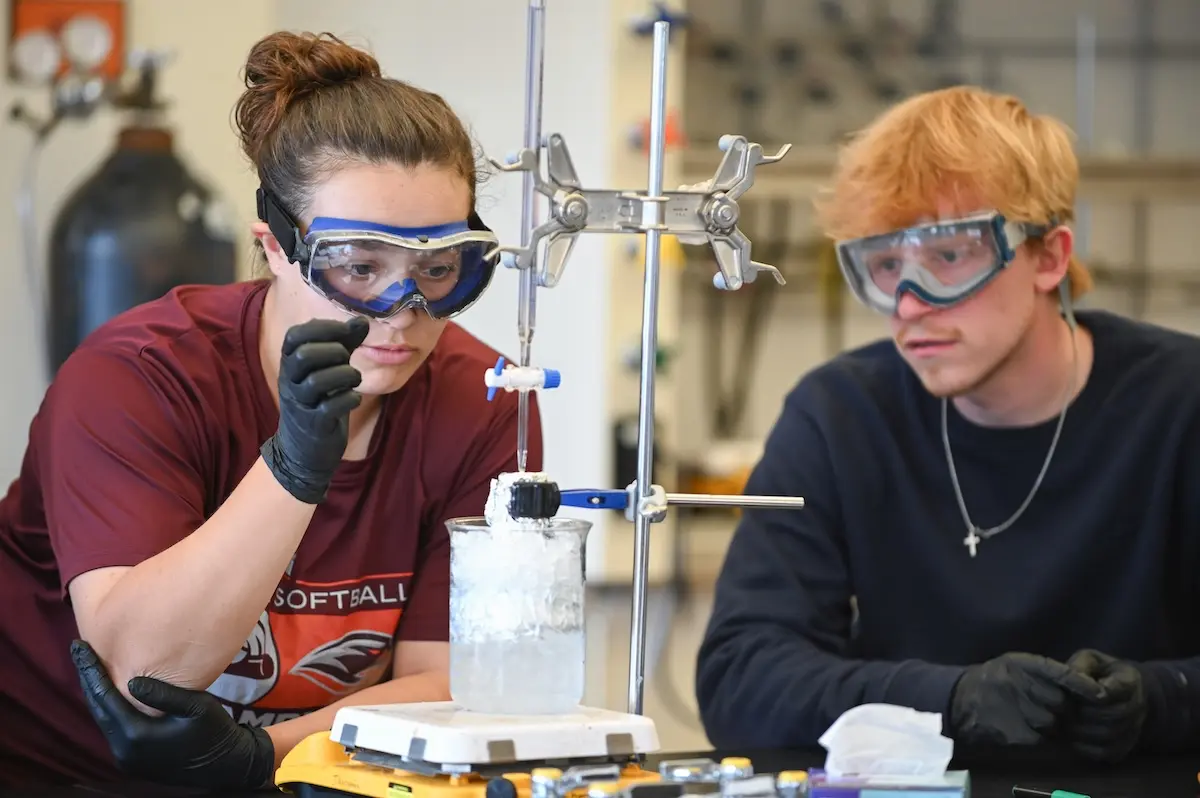
Chemical Physics Degree
At Susquehanna, you can participate in cutting-edge collaborative research within a small, ambitious community. In Susquehanna’s chemical physics program, you can work with a faculty member as early as your first year, applying new knowledge to real scientific problems.
Dive into advanced theoretical concepts, applied sciences and interdisciplinary research with our hands-on, interactive courses. You will gain in-depth experience in our small-size classes with a heavy emphasis on project development.
Prepare for an exciting career, graduating with diverse skills and training, as you explore emerging topics in chemistry and physics. You’ll develop and enhance essential mathematical skills, and refine your scientific communication abilities by presenting research to peers and professionals through oral presentations, conference posters, and co-authored, peer-reviewed publications. Your learning journey is enhanced by access to state-of-the-art facilities, equipped with million-dollar instrumentation.
Advancements in chemistry have lengthened life, created new organic materials and helped humans survive in outer space. The discipline continues to grow and provide a diversity of career paths that prizes innovation.
TOUR THE CHEMISTRY BUILDING
William Dougherty, Ph.D. walks you through our state-of-the-art chemistry department.
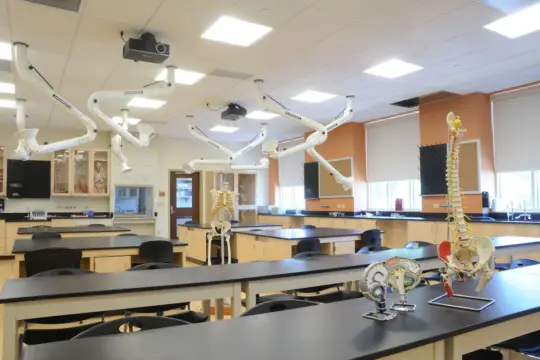
SUSQUEHANNA By the Numbers
More Than Metrics
100%
of students conduct research with faculty by their junior year
$1.2m
in recent National Science Foundation funding for scholarships, summer research funding and major instrumentation
Where Passion Meets Purpose
Straight from the Nest

“The biggest thing that stands out about my majors is the support I’ve had to pursue both fully without sacrificing any of my interests. I can be a music major, take extracurricular band and orchestra classes, and still focus on chemical physics, which is the field I hope to pursue in the future.”
— Faith Simmons ’28
Plan Your Classroom
Program Resources
A Glance Into Your Degree Pathway
With support from advisors and course planning tools, your time at Susquehanna is carefully designed to help you succeed. This example provides a glimpse into your degree experience, but you’ll have plenty of opportunities to customize your path with electives or study abroad programs that reflect your passions and career goals.
Differentiation and integration of polynomials, exponential, logarithmic and trigonometric functions, rules of differentiation, the Mean Value Theorem, L’Hôpital’s Rule, the Fundamental Theorem of Calculus and applications. 4 SH. CC: Analytical Thought.
Basic concepts of stereochemistry and chemistry of aliphatic hydrocarbons, alkyl halides and alcohols. Prerequisite: CHEM-101, CHEM-103 or CHEM-111. 4 SH. 3 lecture hours, 3 laboratory hours (taken as CHEM 221L, not a separate credit/grade).
Techniques of integration. Also includes improper integrals, further applications of integration and power series. Prerequisite: MATH-111 Calculus I or equivalent. 4 SH. CC: Analytical Thought.
Systems of linear equations, matrices and matrix algebra, vector spaces, linear transformations, inner product spaces, determinants, eigenvalues and eigenvectors, and selected applications. Prerequisite: MATH-111 Calculus I. 4 SH. CC: Analytical Thought.
Introduces the macroscopic phenomena of the physical universe. Applies concepts of force, work, energy and momentum to waves, fluids and thermodynamics. Laboratory stresses methods of acquiring data, computer data processing and analyzing the causes of errors. Uses algebra, trigonometry and calculus as the language. Pre- or co-requisite: MATH-111. 4 SH. 3 lecture hours, 3 laboratory hours. CC: Scientific Explanations.
Properties of gases, liquids, solids and solutions, kinetics, acids, bases, buffers, solubility, complex ion equilibria, electrochemistry, and descriptive and coordination chemistry taught in a team-based format. Students may receive credit for only one of the three introductory chemistry II courses: CHEM-102, CHEM-104 or CHEM-232. Prerequisite: CHEM-103 or CHEM-111. 4 SH. 3 lecture hours, 3 laboratory hours (taken as CHEM-106, not a separate credit/grade).
Continuation of Introductory Physics I. Introduces and applies the concept of a field to gravitation, electricity, magnetism, circuits, optics and the atom. Laboratory stresses electronic data acquisition and independent discovery of physical principles. Uses algebra, trigonometry and calculus as the language. Prerequisite: PHYS-204; pre- or co-requisite: MATH-112. P 4 SH.
An in-depth study of classical and statistical thermodynamics and reaction kinetics presented with applications to phase equilibria, chemical equilibria, solute-solvent interactions and nonequilibrium thermodynamics. Prerequisites: CHEM-242, MATH-112 and PHYS-204 (Calculus-based). 4 SH. 3 lecture hours, 3 laboratory hours. CC: Writing Intensive.
Chemical Physics
Choose from a variety of elective courses within this program to customize your goals.
Introduction to quantum chemistry and spectroscopy. Theory of quantum mechanics presented at a fundamental level with special attention paid to classical problems-particle in a box, harmonic oscillator, rigid rotor and hydrogen atom-and practical application to the electronic structure of atoms and molecules and to atomic and molecular spectroscopy. Prerequisites: CHEM-242, MATH-112 and PHYS-206 (Calculus-based) or instructor’s permission. 4 SH. 3 lecture hours, 3 laboratory hours.
Individual investigation of a novel problem in chemistry or biochemistry in collaboration with a faculty member. May be repeated for credit. Prerequisite: instructor’s permission. 1-4 SH.
Chemical Physics
Choose from a variety of elective courses within this program to customize your goals.
Chemical Physics
Choose from a variety of elective courses within this program to customize your goals.
Individual investigation of a novel problem in chemistry or biochemistry in collaboration with a faculty member. May be repeated for credit. Prerequisite: instructor’s permission. 1-4 SH.
This course covers the laws of thermodynamics, thermodynamic functions, heat engines kinetic theory and the statistical mechanics of classical and quantum-mechanical systems. Prerequisite: PHYS-204 and PHYS-206. 4 SH. 3 lecture hours, 3 laboratory hours.
Individual study of a problem in experimental chemistry under the direction of a faculty member, and public presentation of the results. May not be repeated for credit. Co-/Prerequisite: Senior standing and completion of a minimum of 2 semester hours in CHEM-400 during the junior and/or senior year. 2 SH. Capstone.
Chemical Physics
Choose from a variety of elective courses within this program to customize your goals.
Development of reasoning and quantitative skills for problem solving in chemistry courses. Introduction to atomic structure, chemical reactions, chemical nomenclature, formulas, symbols and equations, dimensional analysis and experimental data analysis methods. 4SH. 4 lecture hours. Not for credit toward chemistry or biochemistry major or minor.
Emphasizes the use of chemistry by society and in nature. This course presents the basic chemical concepts in a variety of contexts. Subjects might include environmentally friendly “green” chemistry, medicinal, nanotechnology, chemistry of movies and magic, or chemistry of everyday objects. A student may not enroll in this course after completing General Chemistry I (CHEM-103 or CHEM-111). Pre-requisite: concurrent enrollment in CHEM-100L. 4 SH. 3 lecture hours, 3 laboratory hours. CC: Scientific Explanations.
Lab which accompanies CHEM-100 Trends in Chemistry, which emphasizes the use of chemistry by society and in nature. This course presents the basic chemical concepts in a variety of contexts. Subjects might include environmentally friendly “green” chemistry, medicinal, nanotechnology, chemistry of movies and magic, or chemistry of everyday objects. Concurrent enrollment in CHEM-100 is required.
Fundamental laws and principles, atomic structure and periodicity, bonding, molecular structure, stoichiometry, chemical reactions, energy, equilibrium, thermodynamics and nuclear chemistry. Students may receive credit for only one of the three introductory Chemistry I courses, CHEM-103 or CHEM-111. 4 SH. 3 lecture hours, 3 laboratory hours (taken as CHEM-105, not a separate credit/grade). CC: Scientific Explanations.
Properties of gases, liquids, solids and solutions, kinetics, acids, bases, buffers, solubility, complex ion equilibria, electrochemistry, and descriptive and coordination chemistry taught in a team-based format. Students may receive credit for only one of the three introductory chemistry II courses: CHEM-102, CHEM-104 or CHEM-232. Prerequisite: CHEM-103 or CHEM-111. 4 SH. 3 lecture hours, 3 laboratory hours (taken as CHEM-106, not a separate credit/grade).
Fundamental laws and principles, atomic structure and periodicity, bonding, molecular structure, stoichiometry, chemical reactions, energy, simple acid-base equilibria, thermodynamics and kinetics taught in a team-based workshop format, with the lab and lecture integrated. Students may receive credit for only one of the two introductory chemistry I courses, CHEM-103 or CHEM-111. 4 SH. 3 lecture hours, 3 laboratory hours. CC: Scientific Explanations.
Individual or team investigation of a novel problem in chemistry or biochemistry in collaboration with a faculty member. Introduction to common methods and techniques used in the chemistry and biochemistry fields. This course may only be taken in the first and/or second year of the Chemistry/Biochemistry/Chemical Physics program and can be repeated for credit. Prerequisite: Instructor’s permission. 1-4 SH.
Basic concepts of stereochemistry and chemistry of aliphatic hydrocarbons, alkyl halides and alcohols. Prerequisite: CHEM-101, CHEM-103 or CHEM-111. 4 SH. 3 lecture hours, 3 laboratory hours (taken as CHEM 221L, not a separate credit/grade).
This course explores basic concepts of spectroscopy and chemistry of aromatic hydrocarbons, conjugated alkenes, amines, ethers, carbonyl compounds, carboxylic acid derivatives and carbohydrate building blocks. Prerequisite: CHEM-221. 4 SH. 3 lecture hours, 3 laboratory hours (taken as CHEM 222L, not a separate credit/grade). CC: Writing Intensive.
Structure and reactivity of solids, liquids, gases and solutions will be investigated. Molecular symmetry, molecular orbital theory and chemical kinetics will be introduced. Basic coordination chemistry will be discussed including molecular and electronic structure, acid/base theory, magnetism and common ligands. Students may receive credit for only one of the three introductory chemistry II courses: CHEM-104 or CHEM-232. Prerequisite: CHEM-222 (Organic Chemistry II). 4 SH. 3 lecture hours, 3 laboratory hours.
Analytical methods for the quantitative determination of chemical species and underlying chemical concepts. Topics include analytical processes, measurements, instrumentation, chemical equilibrium and activity, acid-base theory, voltametric and spectroscopic theory. Laboratories include classical titrations and modern techniques with a focus on potentiometry and analytical optical spectroscopy. Prerequisites: CHEM-103 or CHEM-111. Taken concurrently with CHEM-102, CHEM-104 or CHEM-232 or with instructor permission. 4 SH. 3 lecture hours. 3 laboratory hours.
Varied topics reflecting student and instructor interests. Possibilities include organometallic chemistry, environmental chemistry, green chemistry, proteomics and chemistry of art. Prerequisite: CHEM-222 (may be others for some topics). 1-4 SH. Offered as lecture only, laboratory only or as a lecture/laboratory combination.
This course integrates principles from the disciplines of chemistry, biology and pharmacology to study the discovery, design, and mechanisms of action of important anticancer, antiviral, antibacterial, cardioprotective and antidepressant drugs. Major emphasis is placed on drug interactions with nucleic acids, enzymes and receptors. Offered as lecture only. Prerequisites: Junior standing and CHEM-222. CC: Interdisciplinary.
Examines the science and the scientific method through the lens of ethics to distinguish scientific error from outright fraud. The course looks at classic and contemporary scientific blunders and fraud cases in academia, industry, and government. Examines ethical policy from the fallout of academic fraud. Prerequisite: Sophomore standing and CHEM:222. 4 SH. CC: Ethics Intensive, Interdisciplinary.
In this course, students will learn about partition coefficient and biopharmacy, physicochemical properties of drugs, stereochemistry, drug metabolism, volumetric analysis of drugs, analytical spectroscopy, stability of drugs and medicines, kinetics of drug stability, licensing of drugs and the British Pharmacopoeia, method validation, and GMPs. Prerequisite: Junior standing and CHEM-222. 4 SH. 4 lecture hours (may be taught 3 lecture hours, 3 laboratory hours). CC: Interdisciplinary.
This course approaches the challenges, methods, analyses and ethics of forensic chemistry from fundamental chemical and biological perspectives, including quality assurance, sampling and evidence collection and preservation, instrumentation, drugs as physical evidence, analysis of seized drugs, drugs in the body, forensic toxicology, combustion and arson, explosives, firearms, colorants, polymers, paper and fibers and forensic DNA analysis. Students will also be able to articulate the basic ethical questions and issues related to the study of forensics. Prerequisites: Junior standing and CHEM-222. 4 SH. 4 lecture hours (may be taught 3 lecture hours, 3 laboratory hours). CC: Ethics Intensive, Interdisciplinary.
An introduction to many aspects of nanoscience and nanotechnology. Interdisciplinary connections between chemistry, physics, biology and material science are investigated through readings, discussions and laboratory experiments. Major topics include the formation and implementation of nano-structured systems, synthesis and detection of nanoparticles, their current roles in technology, medical applications, ethical implications, and the likely future impact of such systems on society, industry and the environment. Prerequisites: Sophomore standing and CHEM-222. 4 SH. CC: Interdisciplinary.
Chemical species are analyzed by classical quantitative and modern spectrometric methods. Laboratories range from volumetric, gravimetric and potentiometric wet techniques to photospectrometric methods (Uv-vis, FT-IR, AA) and mass spectrometry. This class is specifically designed for the chemistry minor and does not count toward the chemistry major, the biochemistry major or as an elective. Prerequisites: CHEM-102, or CHEM-103-104 or CHEM- 111-112. 4 SH. 3 lecture hours, 3 laboratory hours.
Biotechnology is broadly defined as the application of the principles of molecular and cellular science to the production of biologically important or industrially useful products. Understanding how DNA-templated process are regulated is key to understanding many aspects of biology: cell development and differentiation, the impact of the environment on cellular process, the development, progression and treatment of diseases, etc. This course will explore how scientists use this information to create breakthroughs in disease treatment, the development of genetically modified crops, the development of cutting-edge vaccines, etc. This course will begin with a review of general principles of chemistry, biochemistry, biology and molecular biology. In addition, this course will explore the “tools of the trade” that are used by omics scientists. The course will conclude with a study and discussion of the moral and ethical implications of this information. It will look at rules and regulations governing this information and how the information may be used for the study of diseases (diagnostics, treatments, etc.). It is strongly recommended that students take BIOL-426/CHEM-426 prior to this course. Prerequisite: CHEM 222: Organic Chemistry II. 4 SH
A survey of Biochemistry: structure and function of amino acids, proteins, lipids, carbohydrates and nucleic acids; enzymology; metabolism; biosynthesis; and selected topics. Not acceptable for credit toward a major in chemistry or biochemistry, nor biochemistry minor. Prerequisites: CHEM-104 General Chemistry II or CHEM-232 Structure and Reactivity; and CHEM-222 Organic Chemistry II. 4 SH.
An in-depth study of classical and statistical thermodynamics and reaction kinetics presented with applications to phase equilibria, chemical equilibria, solute-solvent interactions and nonequilibrium thermodynamics. Prerequisites: CHEM-242, MATH-112 and PHYS-204 (Calculus-based). 4 SH. 3 lecture hours, 3 laboratory hours. CC: Writing Intensive.
Introduction to quantum chemistry and spectroscopy. Theory of quantum mechanics presented at a fundamental level with special attention paid to classical problems-particle in a box, harmonic oscillator, rigid rotor and hydrogen atom-and practical application to the electronic structure of atoms and molecules and to atomic and molecular spectroscopy. Prerequisites: CHEM-242, MATH-112 and PHYS-206 (Calculus-based) or instructor’s permission. 4 SH. 3 lecture hours, 3 laboratory hours.
Individual investigation of a novel problem in chemistry or biochemistry in collaboration with a faculty member. May be repeated for credit. Prerequisite: instructor’s permission. 1-4 SH.
This course integrates information from the disciplines of biology and chemistry to explore nucleic acid function and metabolism. In-depth discussions cover the forces behind DNA/DNA, DNA/RNA and DNA/protein interactions as they apply to DNA structure and metabolism, RNA function and metabolism, protein synthesis, and gene regulation. Prerequisite: CHEM-104 General Chemistry II or CHEM-232 Structure and Reactivity; and CHEM-222 Organic Chemistry II. Strongly recommended: BIOL-426/CHEM-426. 3 SH. 3 lecture hours.
Exploration of nucleic acids, including methods of isolation, purification, identification and analysis. Prerequisite: Gen Chem II (CHEM-104) or CHEM-232 Structure and Reactivity; and CHEM-222 Organic Chem II. 1 SH. 3 laboratory hours.
This course covers the structure and function of major biomolecules such as carbohydrates and lipids and their role in metabolism. Energy metabolism and biomolecule biosynthesis and degradation are emphasized. Prerequisite: Gen Chem II (CHEM-104) or CHEM-232 Structure and Reactivity; and CHEM-222 Organic Chem II. Strongly recommended: BIOL-426/CHEM-426. 3 SH. 3 lecture hours.
This course focuses on the structure of proteins, the thermodynamics of protein folding, enzyme catalytic mechanisms and enzyme kinetics. This course also introduces the field of bioinformatics, the use of computer databases to determine relationships between nucleic acid sequence, protein structure and protein function. Prerequisite: Gen Chem II (CHEM-104) or CHEM-232 Structure and Reactivity; and CHEM-222 Organic Chem II. 3 SH. 3 lecture hours.
This lab explores enzyme kinetics and inhibition as well as methods of isolation, purification, identification and analysis of proteins and enzymes. This lab is designed to provide technical skills necessary for biochemical research. Prerequisite: Gen Chem II (CHEM-104) or CHEM-232 Structure and Reactivity; and CHEM-222 Organic Chem II. 1 SH. 3 laboratory hours.
This lab explores metabolic function and metabolites. The lab focuses on the isolation, purification, identification and analysis of metabolites. Prerequisite: Gen Chem II (CHEM-104) or CHEM-232 Structure and Reactivity; and CHEM-222 Organic Chem II. 1 SH. 3 laboratory hours.
Instrumental techniques of analysis, focuses on atomic and molecular spectroscopy, including chemical principles behind the instrumental techniques, instrument operation and applications of instrumental analysis. Some discussion of macromolecule (polymer) analysis will also be included. Prerequisite: CHEM-342 or instructor’s permission. 4 SH. 3 lecture hours, 3 laboratory hours.
Advanced physical and electronic structure of transitional metal complexes, reaction mechanisms, bulk properties of metals, principles of organometallic chemistry and bioinorganic chemistry. Prerequisite: CHEM-232. 4 SH. 3 lecture hours, 3 laboratory hours.
Individual work for qualified students under the direction of a faculty member. Usually deals with specialized topics not covered in regularly offered courses. Prerequisite: Instructor and department head approval. 2-4 SH.
Individual study of a problem in experimental chemistry under the direction of a faculty member, and public presentation of the results. May not be repeated for credit. Co-/Prerequisite: Senior standing and completion of a minimum of 2 semester hours in CHEM-400 during the junior and/or senior year. 2 SH. Capstone.
Investigation of a specific topic or problem under the guidance of an appropriate faculty member. 1-4 SH.
Weekly meetings in which students report on current chemical research literature. Researchers from other institutions and industry will also be invited to present their research. Four semester hours in a manner approved by the student’s adviser are required for all majors. Prerequisite: Junior standing. 1-4 SH.
Selected students work in the chemical industry under the supervision of an industrial chemist. Prerequisite: CHEM-242 and department head’s permission. 4 SH. S/U grade.
When you enroll at Susquehanna, you’ll be paired with an advisor and application tool to guide you in your course planning and scheduling. The following is an excerpt from the complete course catalog. Enrolled students follow the requirements of the course catalog for the academic year in which they declare each major and/or minor, consult with their advisor(s).
Learning Goals
- Demonstrate the ability to apply appropriate chemical and physical models to make predictions or draw conclusions regarding chemical systems or phenomenon. Examples of chemical systems are compound formation (synthesis), energy transfer, equilibrium composition, various physical properties, chemical reactivity, etc.
- Demonstrate mastery of laboratory skills and execute common experimental techniques.
- Demonstrate the ability to design, prepare, execute and adjust experiments.
- Describe the theoretical and operational principles of common laboratory instrumentation such as NMR, FT- IR, UV-Vis, AA, fluorescence spectrometers, GC-MS, HPLC and electrochemical analysis instrumentation, as well as their typical uses, sensitivities and limitations. Interpret the data collected with such instrumentation.
- Find topic-specific chemical literature, interpret and evaluate chemical studies as described in scientific journals, and describe these conclusions through written and oral presentations.
- Analyze and interpret data to detect trends, evaluate the quality of data and reach scientifically valid conclusions.
American Chemical Society Accreditation
The department’s major in chemistry is accredited by the American Chemical Society.
Majors in Chemistry, Biochemistry and Chemical Physics
Susquehanna offers a Bachelor of Arts degree in chemistry and Bachelor of Science degrees in chemistry, biochemistry and chemical physics. Two biochemistry tracks are available: an ACS-Certified track and a Biology-Intensive track. The ACS-Certified track includes courses that cover properties of metals, spectroscopic techniques and instrumental methods that will prepare students for careers or graduate programs in the areas of biochemistry or biophysics. The Biology-Intensive track includes courses that will offer a solid foundation in chemical principles in addition to biological systems and will prepare students for careers or graduate programs in the biological sciences or biochemistry, or the health care professions. All required courses must be completed with a grade of C- or higher.
Double-counting restriction
Students majoring in chemical physics cannot double-count courses towards a chemistry or physics major
Major in Chemical Physics
The Bachelor of Science degree in chemical physics requires the following courses with grades of C- or better:
- 4 General Chemistry I
- Choose from: CHEM-103 or CHEM-111
- 4-8 General Chemistry II
- Choose from: CHEM-104
or CHEM-232 and CHEM-242
- Choose from: CHEM-104
- 4 PHYS-204 Introductory Physics I: Calculus
- 4 PHYS-206 Introductory Physics II: Calculus
- 4 CHEM-221 Organic Chemistry I
- 4 CHEM-341 Physical Chemistry I
- 4 CHEM-342 Physical Chemistry II
- 4 PHYS-404 Thermodynamics and Statistical Methods
- 4 MATH-111 Calculus I
- 4 MATH-112 Calculus II
- 4 MATH-201 Linear Algebra
- 2 Capstone
- Choose from CHEM-500 Problems in Chemistry and Biochemistry or PHYS-550 Physics Research.
Students must complete at least 2 SH of CHEM-400 Research Experience prior to taking CHEM-500.
Other requirements
Students must select at least four courses from the following list, with at least one course from each department and no more than two courses from a single department. Students may take additional courses as long as the total number of semester hours in the major does not exceed 64.
Chemistry
- 4 CHEM-306 Nanoscience
- 4 CHEM-430 Instrumental Analysis
Mathematics
- 4 MATH-211 Multivariate Calculus
- 4 MATH-353 Differential Equations
Physics
- 4 PHYS-101 Introduction to Digital and Analog Electronics
- 4 PHYS-105 Independent Thought and Exploration in Physics
- 4 PHYS-306 Modern Physics
- Chemical Engineer
- Applications Chemist
- Materials and Process Engineer
- R&D Analytical Chemist
- Quality Assurance Engineer
Recent Employers
Beyond Susquehanna
Meet the Faculty
TAKE A VIRTUAL TOUR
Launch Natural Sciences CenterYOU MAY ALSO BE INTERESTED IN
See the full list of related programs on the School of Natural and Social Sciences page.
Have Questions?
Contact Us
Start your journey.







